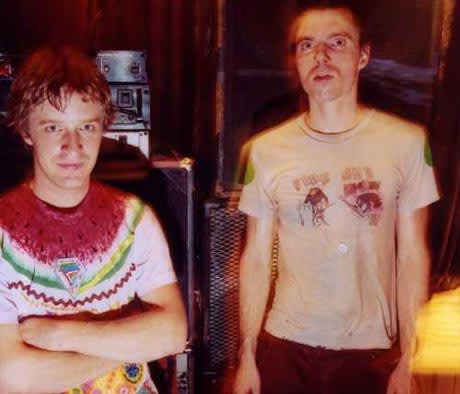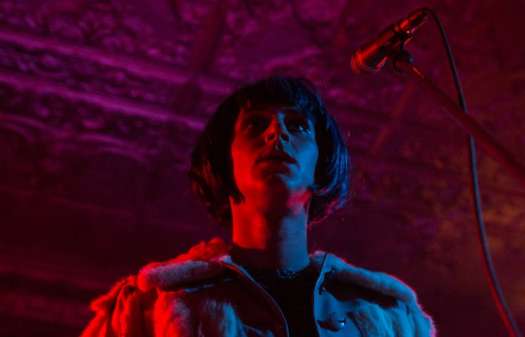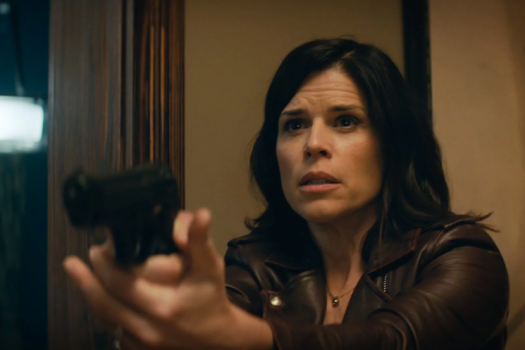Lightning Bolt really couldn't have picked a better name for their group, because when the duo of Brian Gibson and Brian Chippendale get behind their respective bass guitar and drum kit and kick into one of their brutally loud and intensely energetic noise-rock assaults, you'll swear you're being belted in the chest by a zillion volts of cosmic electricity that just doesn't stop. Gibson's pummelling, ultra-amplified hyper-riffs just keep on coming, and Chippendale's spastic, amazingly precise skin pounding never lets up, not even for a moment. Just give their fourth and latest opus, Hypermagic Mountain, a listen. If it doesn't knock you flat on your ass with its mega-rock power nothing will.
The sort of energy and mayhem Lightning Bolt (as well as each member's side-project, Chippendale with Mindflayer and Gibson with Wizzards) are accustomed to blasting out is best suited for a live environment, and rather difficult to capture in the studio. Recorded this past June, Hypermagic Mountain (on Load Records) is split between studio-recorded tracks and tracks done in their own practice space. "We started off going into a studio for three days, and then after that we felt like we hadn't played well enough and we weren't sure if the room we were playing in sounded good enough and we decided that we should just set up a really basic recording studio in our practice space using just a few tracks," says Gibson.
"We used a mixer going into a DAT machine. We figured maybe it would sound a little more crude, but if we're in that kind of environment, it's really relaxed, we'll be able to play way better, we'll be able to do takes and sit back and listen to em and talk about em and refine things. So we just gave ourselves a long time and we only played for maybe an hour or a little more every day we tried to not push ourselves too hard and tried to get in a mode where we were enjoying what we were doing. I think it was a wise decision because a lot of the stuff we did there ended up being better than the stuff we recorded in the studio." Gibson feels that the recording of Hypermagic Mountain is like an end of an era for the band. "We're taking a little break, and then we want to start really fresh again. I want to try new instruments and amps. I just want to mess around a little bit right now. We've been doing what we've been doing for a while."
Formed in Providence, Rhode Island in 1994 while Gibson and Chippendale were attending art school (along with their friends in Black Dice, with whom Gibson drummed for a short while), Lightning Bolt featured a third member during its first year and a half Hisham Bharoocha, who later joined Black Dice on drums. "He had a few toms that he would play, but he mostly sang and barely got into starting to play some keyboard stuff before we decided we wanted to be a two-piece," says Gibson. "At some point during this winter session between semesters, he'd gone overseas and Brian and I played just the two of us and we got really into it and decided being a two-piece would be more exciting. It was really cool to be reacting to just one other person, it just seemed way more dynamic, and everything could shift way more dramatically. When we were playing with Hisham, it seemed like we would be laying down these grooves and he would be doing all the interesting stuff on top of it. It was way more jammy, but when we played with the two of us it seemed like the music had way more energy because the rhythm section had to hold its own and it couldn't just rely on something else interesting floating on top of it."
Ever since then, Lightning Bolt have been blowing minds and power supplies as a two-piece army of sound, both in concert and on wax. One of the key elements to their notoriously ferocious live shows is how they don't play on stages, but rather set up their gear on the floor where the swarming audience can surround them. "For me, it's making a show more about an experience for people rather than something that's being staged. By playing on the floor, first of all you've changed what people are expecting a little bit, so that they feel like something's happening that's different in some way, and it's happening on the same level as them," said Gibson. "I think everyone suddenly feels like they're weirdly members of the band when we do that, and everybody suddenly has a stake in whether the show goes well or not."
The sort of energy and mayhem Lightning Bolt (as well as each member's side-project, Chippendale with Mindflayer and Gibson with Wizzards) are accustomed to blasting out is best suited for a live environment, and rather difficult to capture in the studio. Recorded this past June, Hypermagic Mountain (on Load Records) is split between studio-recorded tracks and tracks done in their own practice space. "We started off going into a studio for three days, and then after that we felt like we hadn't played well enough and we weren't sure if the room we were playing in sounded good enough and we decided that we should just set up a really basic recording studio in our practice space using just a few tracks," says Gibson.
"We used a mixer going into a DAT machine. We figured maybe it would sound a little more crude, but if we're in that kind of environment, it's really relaxed, we'll be able to play way better, we'll be able to do takes and sit back and listen to em and talk about em and refine things. So we just gave ourselves a long time and we only played for maybe an hour or a little more every day we tried to not push ourselves too hard and tried to get in a mode where we were enjoying what we were doing. I think it was a wise decision because a lot of the stuff we did there ended up being better than the stuff we recorded in the studio." Gibson feels that the recording of Hypermagic Mountain is like an end of an era for the band. "We're taking a little break, and then we want to start really fresh again. I want to try new instruments and amps. I just want to mess around a little bit right now. We've been doing what we've been doing for a while."
Formed in Providence, Rhode Island in 1994 while Gibson and Chippendale were attending art school (along with their friends in Black Dice, with whom Gibson drummed for a short while), Lightning Bolt featured a third member during its first year and a half Hisham Bharoocha, who later joined Black Dice on drums. "He had a few toms that he would play, but he mostly sang and barely got into starting to play some keyboard stuff before we decided we wanted to be a two-piece," says Gibson. "At some point during this winter session between semesters, he'd gone overseas and Brian and I played just the two of us and we got really into it and decided being a two-piece would be more exciting. It was really cool to be reacting to just one other person, it just seemed way more dynamic, and everything could shift way more dramatically. When we were playing with Hisham, it seemed like we would be laying down these grooves and he would be doing all the interesting stuff on top of it. It was way more jammy, but when we played with the two of us it seemed like the music had way more energy because the rhythm section had to hold its own and it couldn't just rely on something else interesting floating on top of it."
Ever since then, Lightning Bolt have been blowing minds and power supplies as a two-piece army of sound, both in concert and on wax. One of the key elements to their notoriously ferocious live shows is how they don't play on stages, but rather set up their gear on the floor where the swarming audience can surround them. "For me, it's making a show more about an experience for people rather than something that's being staged. By playing on the floor, first of all you've changed what people are expecting a little bit, so that they feel like something's happening that's different in some way, and it's happening on the same level as them," said Gibson. "I think everyone suddenly feels like they're weirdly members of the band when we do that, and everybody suddenly has a stake in whether the show goes well or not."




